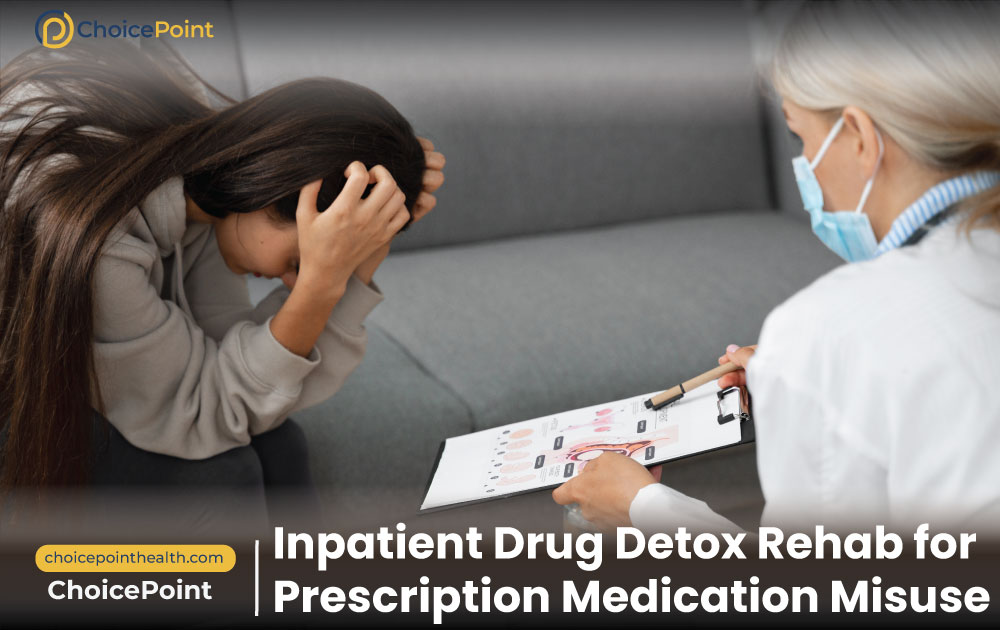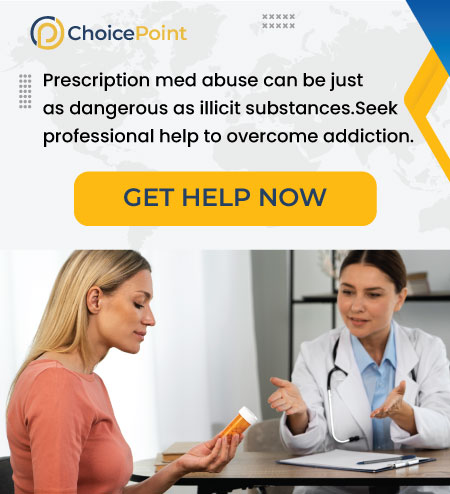Addiction comes in different forms, and while prescription medications help many people in different ways, their nonmedicinal use can result in dependence and even addiction. If you resonate with this statement, inpatient drug detox and rehab can be the right option for you.
In 2017, prescription meds abuse rendered 14,139 overdose deaths, and the number rose to 16,706 in 2021. According to MHA, the most commonly abused prescription drugs include pain relievers, tranquilizers, and sedatives. Those with a preexisting mental health condition are 3 times more likely to misuse prescription drugs.
Any sort of dependence on substances is dangerous for mental and physical health. Contact ChoicePoint’s DEA-certified addiction specialist by calling 844.445.2563 or entering your data here.
Table of Contents
What Is Considered Prescription Medication Misuse?
Drugs, whether prescription or illicit, have the power to alter the way that the brain works if taken for a prolonged period. Any medication used for purposes other than the ones it is intended for is categorized as prescription medication misuse. Different types of medications are abused.
Pain Medications
Most commonly abused pain medications include opioids like hydrocodone, morphine, fentanyl, and oxycodone. Individuals who take medications get used to the initial dosage. Once the brain gets accustomed to the dose, it stops being effective. This may move people toward higher dosages without consulting their healthcare provider. Inpatient drug rehab near you for prescription opioid misuse provides recovery options that can help people addicted to opioid drugs.

Are you familiar with the fact that 3 to 19% of Americans who use pain medication will get addicted to them?

Are you familiar with the fact that 3 to 19% of Americans who use pain medication will get addicted to them?
CNS Depressants
Benzodiazepines are the most commonly prescribed CNS depressants for anxiety. Benzos are risk-free if taken as per prescription. However, people with SUDs are at great risk of abusing them. One of the risky ways to use anxiety meds is by combining them with addictive substances like alcohol.
CNS Stimulants
Many people with certain conditions like ADHD or narcolepsy are prescribed CNS stimulants. ADHD makes a person more prone to developing addiction. Some prescription medications like Adderall pose a risk of abuse. Other Commonly abused illicit stimulants, including meth and cocaine, can lead to significant long-term health problems.
Signs of Prescription Drug Abuse
Signs and symptoms of prescription drug misuse differ according to the drugs in question. Opioid medication poses different symptoms than benzos, etc.
| CNS Depressants | CNS Stimulants |
| Issues in coordination | Increased alertness |
| Slurred speech | Hyperactivity |
| Issues with focus and memory | Increase body temperature |
| Taking higher doses | Paranoia and hallucinations |
| Dizziness | Insomnia |
| Issues in breathing | High BP |
Identifying with any of these signs? You can also take our free 5-minute addiction evaluation test that can help you to learn your addiction level.
Please note this assessment is an initial self-screening, and it is not meant to be a medical assessment or clinical diagnosis of addiction. For proper diagnosis and treatment, schedule an appointment with ChoicePoint to undergo inpatient drug detox and rehab for prescription medication misuse. Contact us at 844.445.2563 or here.
Overcoming Drugs Misuse with Inpatient Drug Detox and Rehab
One of the tools to overcome prescription medication abuse is inpatient drug detox and rehab. Contrary to the common belief, you can undergo drug detox for prescription medications as well. Below are some ways in which drug detox will help you.
Role of Inpatient Drug Detox and Rehab
Detox is a medical procedure in which drugs are taken out of the body via medications. In an inpatient drug detox program, individuals receive
- Medical supervision
- Support for withdrawal
- Medications to manage pain
- Psychological support
This phase is carefully managed by healthcare professionals who can address any complication that may occur and ensure the safety and comfort of the individual.

Why is Prescription Drug Abuse on the Rise
Detox Is the First Step: What Happens Next In Inpatient Drug Detox and Rehab?
Detox is essential to prepare the body for other treatments like medication-assisted treatment and therapy.
a. Medication-Assisted Treatment
Inpatient rehabs offer comprehensive treatment. Therefore, MAT is also available for prescription medication abuse if the doctors deem it safe. Medications used in MAT for prescription opioids like hydrocodone include:
- Naltrexone
- Buprenorphine (Butec patches/Subutex)
- Buprenorphine/Naloxone (Suboxone)
After evaluation, these medications and some others may be used to assist individuals with withdrawal and help in abstinence.
b. Holistic Drug Detox and Rehab
Detox is usually coupled with counseling and medication-assisted treatment programs. A holistic detox offers both, especially within inpatient settings.
i. Individual Therapy
Individual therapy sessions are required to regulate a person’s thoughts that may push them into relapse. While detoxification primarily focuses on the physical process of removing substances from the body, individual therapy also
- Provides a supportive environment
- Addresses root causes of addiction
- Equips with new coping strategies
- Helps maintain sobriety
There are many benefits of therapy because apart from physical symptoms, emotional and psychological needs also need to be addressed.
ii. Group Therapy
Some individuals enroll themselves in group counseling sessions. There are many benefits of this sort of therapy including:
- A sense of accountability
- Feeling of belonging
- Reducing isolation
- Tackling mental health issues along with therapy
While sharing your trauma in front of others seems intimidating, it is beneficial for those undergoing treatment.
Aftercare Services
Recovery doesn’t stop after the completion of inpatient detox or rehab. It is a continued process. However, it is not always easy, which is why our specialists offer aftercare services to promote abstinence and recovery in the long run.
Our inpatient drug detox is combined with therapy and a medication-assisted treatment (MAT) program. Contact us at 844.445.2563 or enter your contact information here.
Prescription Drug Addiction Rehab in New Jersey
Whether you are looking for benzo addiction rehab or opiate rehabilitation, we are here to cater to you. ChoicePoint is a leading addiction rehab that addresses most sorts of substance use disorders.
You can undergo all the mentioned treatments in the following settings:
Keeping in view flexibility and accessibility for everyone, ChoicePoint offers a wide range of care levels in New Jersey treatment centers to all clients seeking help with substance abuse. All you need to do is contact us at 844.445.2563 or fill out your information here.
Inpatient Drug Detox and Rehab in New Jersey: Top Queries
Prescription medication abuse is a grave concern in the country. The more nuanced your knowledge is, the better.
How Can Prescription Drug Abuse Be Prevented?
- Take as per your doctor’s instructions
- Don’t use anyone else’s prescriptions
- Talk to your doctor before taking any medication
- Don’t alter your doses before talking to your doctor
What Are the Most Common Prescription Drug Abuse?
Pain medications, depressants, and stimulants are the most commonly abused drugs. Pain relievers include Oxycontin, Vicodin, and Dilaudid; depressants include benzodiazepines; and stimulants include Adderall and Ritalin. There are various reasons why people abuse prescription drugs.
Why Are Teens More Vulnerable to Heroin and Prescription Opioids?
Teens may misuse heroin and prescription opioids due to peer pressure, curiosity, mental illnesses, stress, or other such triggers. Teens are in a vulnerable phase of life. Taking any drug can interfere with normal brain functioning, making them more prone to addiction.
What Is an Example of Drug Misuse?
One example of prescription drug misuse includes not taking medications for the intended purposes. Other examples are increasing the dose without medical consultancy or taking them with other drugs.
Are Prescription Drugs Safe?
Yes, prescription drugs are usually safe, but there is a potential for abuse, which is why they should never be taken without the consultation of your doctor. Not taking it properly can result in addiction and other graver issues.
Can Too Much Prescription Be Harmful?
Prescription drugs can be dangerous, which is why these are available only to those who have a prescription. It is highly dangerous to acquire prescriptions for many medications. Too much medication intake can result in internal bleeding or drug overdose.
Medical Disclaimer:
ChoicePoint aims to improve the quality of life for people struggling with substance use disorder and mental health issues. Our team of licensed medical professionals research, edit and review the content before publishing. However, this information is not intended to be a substitute for professional medical advice, diagnosis, or treatment. For medical advice please consult your physicians or ChoicePoint's qualified staff.











Review Inpatient Drug Detox and Rehab for Prescription Medication Misuse.